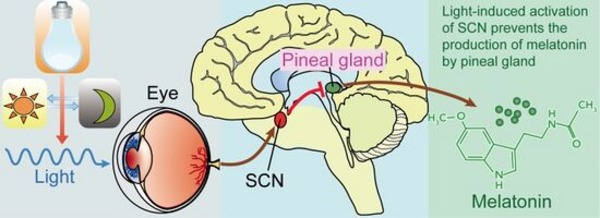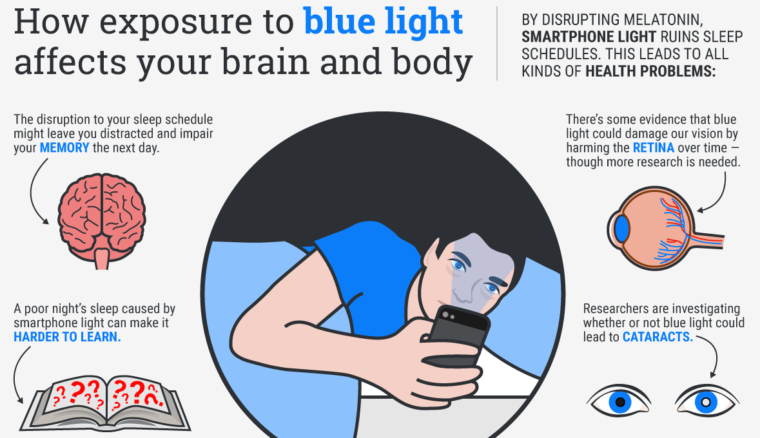With the rise of our inability to fall asleep at night, one frequent characteristic of our daily activities is to check our messages on our cell phone before turning in for the night. Or to watch a video on our electronic device. The use of this modern technology is exposing us to something called Blue Light.
Blue light is a type of high-energy visible light with short wavelengths. Our smartphones, tablets, or computers emit blue light. Studies have shown that blue light suppresses melatonin production. The brain plays a pivotal role in signaling the body’s need to sleep. The hypothalamus in particular responds to environmental cues such as light to synchronize the body’s sleep-wake cycle. Our internal clock, known as the circadian rhythm, is regulated by a section within the hypothalamus.
Blue Light
The wavelength is measured in units called lux, which can be thought of as a wavelength. The shorter wavelength or higher the frequency, the more energy the light carries. A wavelength of 480 to 550 nanometers is considered the blue light spectrum. Exposure to more than 30 lux of blue light in the evening is often associated with increased melatonin suppression.
Our brain communicates the need for sleep to the pineal gland, a structure located deep within the brain. The pineal gland receives stimuli primarily from light exposure. Specialized cells within the eyes communicate light conditions to the pineal gland. In response to changes in light, the pineal gland adjusts the production of melatonin, a hormone that influences sleep patterns. Stimulated by darkness, the pineal gland increases melatonin production by signaling to the body that it is time to go to sleep.
The Importance of the Pineal Gland
The pineal, located with the epithalamus section of the brain, interacts with the hypothalamus and impacts multiple organs and glands throughout the body. Our pineal gland interacts with the endocrine system and helps to regulate hormones that impact mood and reproductive cycles as well as the sleep cycle.
The use of smartphones at night affects the impact of blue light on sleep. Because we tend to hold our phones immediately in front of us, the intensity of the light exposure may disrupt our body’s natural sleep-wake cycle. Prolonged exposure to smartphones before bedtime can contribute to insomnia as well as other sleep-related issues. The level at which blue light becomes unsafe is not precisely defined, as it depends on various factors such as the intensity, duration of exposure and individual sensitivity.
Not all smartphones produce the same amount of blue light. Some models now have features such as night mode or even blue light filters to help reduce the emission of blue light. Perhaps consider including such features the next time one is shopping for a new cell phone. Limit the amount of time spent on your smartphone, especially in the evening and before bedtime.

Melatonin regulaltes the sleep-wake cycle
Melatonin, once strictly a prescription medication, is now readily available over the counter. It is not a traditional sleep aid, but a hormone that regulates sleep-wake cycles. There are currently is not any blood test to routinely measure one’s melatonin levels. Some functional and integrative medicine practitioners may order a special kind of blood analysis called an assay to get a picture of one’s melatonin production over a 24-hour period. Healthy lifestyle changes to avoid blue light at night as well as sleeping in darkness may be a more viable consideration before looking to add a melatonin supplement into one’s daily routine.
As always, all the information in this article is information only, and is not to be taken as medical advice. Please see your medical doctor for formal advice.
Barry Schustermann
Follow me on X @BarrySchust
Follow me on Facebook @Barry Schustermann



